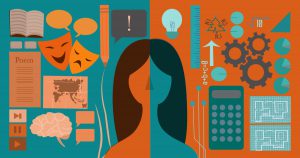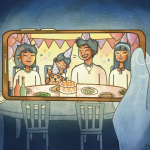

Last year, when I was an incoming third-year engineering student, it suddenly hit me that perhaps my chosen degree wasn’t the one for me. I really did not expect myself to feel this way because nobody forced me into the program. I applied for an engineering degree primarily because of my interest to create something useful or perhaps for my young and ideal self, to create something that could potentially change the world. (Of course, all the young and ideal people always intend to change the world.) Like most people my age at that time, I was so keen on changing the world but not so much in understanding it.
When I began college, I saw the need to shift my own thinking. All at once, I recognized that changing the world would be very difficult. So rather, I just might devote my energy to understanding it. All of a sudden I found myself getting more and more interested in writing, reading about history, politics and literature – matters that should not have been my focus given the career path I had chosen to pursue. But I couldn’t help it, I really enjoyed discovering them for myself and sometimes even more than what we were doing in class. Having not many like-minded people around, I really thought I was misplaced and I had to go.
“The way I see it, there can be similarities between seemingly unlike disciplines.”
Although I understood my case early enough for me to transfer to another program had I preferred it, I decided to stay in engineering, hardly convincing myself that it was the right thing to do. I could not dismiss the fact that I was attached to both sciences and humanities. It’s even more difficult for me because of how our modern education had already carved out a specific learning track for a particular degree program allowing students to specialize in their chosen field. In college, when students like me are made to choose a degree program, it is almost like we are being pushed into specific categories of specializations wherein the boundaries have strictly been pre-determined by the technicalities of every field.
The way I see it, there can be similarities between seemingly unlike disciplines but there is hardly any thought among people that the different areas of knowledge can actually coincide with each other. Take for instance, mathematics and poetry. My math professor once wrote in his independently published book, “Mathematics is a language and an art in itself.” Math, as the language of science, mainly aims to express complicated theories into very precise and accurate terms— equations. I have always admired our professor’s genius in expressing his calculations in ways we could not have thought possible. In the same way, I would admire a text in a book for conveying very compelling thoughts I could not have articulated myself. And I must also admit that I had one of those days when I would sit in a math class and get very distracted by my admiration of a poem with a language so beautifully crafted. I would stare at the board filled with solutions and realize the same thing. The equations too were so elegant in their own way. After all, they are not so different from one another if one would only take an effort to look at them closely.
There were days when I actually felt guilty of my own distractions and days when I would get very frustrated because I thought I really was not making any sense. What do I make of these weird observations? Is it really possible for two very different areas of knowledge to marry each other and produce something more meaningful? I think, yes because as I had managed to go through another year under my program, I also began seeing the gaps and the need to bridge these gaps.
Speaking from my experience, I think that engineering, as an academic pursuit, is full of ruptures. It tackles the very intricate and complex technical aspects of how the world works, in terms of new technologies and scientific theories on almost every angle possible except for one very important aspect: purpose. I think it would be a big mistake for anyone who wishes to specialize on one thing and not know exactly what to make of one’s motives for doing so. I got used to encountering people who say that they chose engineering because they want to make a lot of money or maybe because they want to earn a title and attach it to their name. However, such motives should not be the case for anyone who is being trained to be at the forefront of innovation.
“I think that engineering, as an academic pursuit, is full of ruptures. It tackles the very intricate and complex technical aspects of how the world works, in terms of new technologies and scientific theories on almost every angle possible except for one very important aspect: purpose.”
Engineers, most especially, must be able to address these issues in them in order to better steer and lead people through their potentially groundbreaking ideas. One must not only know how to solve problems but more importantly to identify what the right problems are. Engineering alone has the tendency to misplace its cleverness. Some of the breakthroughs we see today do not necessarily translate into something beneficial because the leaders in technology may not always see what the right problems are and the implications that arise due to the development and improper use of technology. With the recent incidents on the misuse of people’s data through Facebook and other social media platforms for example, we can recognize that our modern lives are filled with technological disruptions that pose even more problems than the ones what we ought to resolve. And I think this is because of a very important element missing in our understanding of engineering: advocacy. Engineering without an advocacy can easily be dismissed as something that is unnecessary because it would hardly connect to the people or the community it means to improve. Engineering, in all forms, must always be guided by a meaningful purpose.
So more than just the application of math and science, there is a need for engineers to be exposed to the important lessons acquired through humanities and the liberal arts such as history, politics, language and literature. Effective technology does not only pose questions on its functionality but more importantly the questions on its social impact and relevance. With this, the issues that cannot be directly addressed by engineering are compensated by overlapping the parallels among other disciplines.
“Engineering alone has the tendency to misplace its cleverness. Some of the breakthroughs we see today do not necessarily translate into something beneficial because the leaders in technology may not always see what the right problems are. “
It is essential that we understand the history of technology in order to best map out the possibilities of where we should be heading. Very few people also realize that even innovation has its own form of politics that shows us the indirect effects of technology in every decision we make, especially for those people who are not in power. On the other hand, language also has its own role in helping engineers to effectively communicate technical concepts and collaborate better in teams. And more importantly, I know that it is through literature that any individual, especially engineers, can best improve on the value they rarely own: empathy. Through these, we can be more aware of the community we belong in, understand what the real problems are, develop into highly critical thinkers and become responsible citizens.
In De La Salle Lipa (DLSL), the engineering students’ exposure to such areas is at its minimum. With the new curriculum which will be implemented for the incoming engineering students, the liberal arts courses under the general education for each degree program may be further reduced. In our batch, there are liberal arts courses offered in the first two years of an engineering degree but in my opinion, they are not properly integrated within program and have sometimes been underestimated by the students and even by the faculty themselves. I remember one time, my own teacher has even discouraged me on my writing, saying that I must give my entire time solely to my studies because being an engineering student is highly demanding. I have never shared the same sentiment with my teacher instead everytime I’d hear such remark, it reminds me of what Leloy Claudio, a Filipino historian, once said. “College is not just about forming workers. College should be an opportunity to find yourself.”
The academic culture here at DLSL focuses too much on specialization and somehow overlooks the advantages of engaging in interdisciplinary areas, which is already an ongoing trend among many institutions around the world. Many people, including the students and even the faculty in our school, still have not realized this. However, if our schools do not provide us with these avenues, I still don’t think why we should not do so on our own. Today, I see it as one of our biggest challenges as engineering students, to go beyond what is taught inside the classroom, to explore more and look under the surface of things.
“Today, I think we simply just cannot separate the study of science and technology with the understanding of the society because of how they have been glued together by the modern culture. “
To me, it’s very incredible to discover people like Richard Blanco, an American poet who also happen to be an engineer, saying, “Some of the most brilliant minds and some of the most brilliant solutions and things that have changed the world have been through a synthesis of knowledge from seemingly disparate places. Knowledge is all connected. Nothing is ever put to waste.”
Now, I am already a fourth-year engineering student with just two more years ahead of me. When I try to look back and remind myself of the reason why I stayed in engineering, I always come down to a conclusion that regardless of how much thought I put into it, I will always end up reconciling my curiosities and refusing to give up one over the other. A little part of me still wants to change the world. Even though I know that understanding it is way easier, I also know that such would simply not be enough. Samuel Florman has also said it in his book, “The Introspective Engineer.” “The implicit conviction of every engineer is that thought will lead to action.”
I have always believed that being a well-rounded person will always strengthen who we are. As I am guided by this possibility, I am also looking forward to discover how I can best overlap the diversities inside me. And to be honest, I still don’t know exactly how, but one day I’ll figure it out for myself. I’m still working on it. And I think that’s fine.

